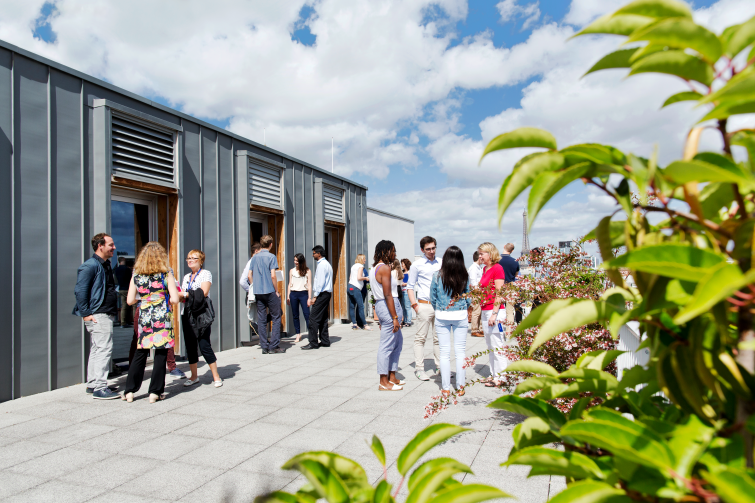
 institution
institution
Message from Stewart Cole : 500 days on
"Dear colleagues,
Over 500 days after taking office and well into the 131st year of the Institut Pasteur, I would like to share some thoughts and impressions with you before our ways part for the Summer.
The celebratory events bookending the 130th anniversary of the institute ended in May having begun with a high level meeting on global health in November 2017, which was a resounding success, and concluded with an international symposium celebrating the diversity of our science. The latter event featured outstanding presentations by selected Alumni, our young, and not so young, scientists and principal investigators (PI) that occasionally deserved a bigger audience.
This year, after extensive consultation with the PIs, two new departments were created, Global Health and Computational Biology, thus bringing the total to twelve and showing that we are in touch with our time. Our next objective is to be ahead of the game and, here, I am confident that the new generation of department directors will maintain the momentum established by their predecessors. The department of Computational Biology is to be congratulated for its role in the Prairie consortium, a dynamic national initiative to harness artificial intelligence for the benefit of human health.
The 2019-2013 strategic plan is now underway and scientific progress can be followed by following this link. I have been impressed by the enthusiasm and commitment with which the Pasteur community has embraced the strategic plan and this augurs well for major achievements. I would like to thank all involved, especially the leaders of the research axes and concerted actions.
Our Neuroscience axis recently received a boost in the form of the Hearing Institute, a new Institut Pasteur centre, located off campus, that was created in partnership with the Foundation for Hearing, a subsidiary of France’s leading science benefactor, the Bettencourt-Schueller Foundation. The founding director is Professor Christine Petit. The Hearing Institute will officially open later this year but, in the meantime, please save the date for the inaugural scientific symposium (September 16-17th) at the Collège de France.
One of the cross-cutting objectives of the strategic plan is to interact more with society and an excellent example of this was provided by the recent open day on Autism, where our scientists and clinicians explained to the public the value of their work and its potential benefit to individuals affected by autism spectrum. Similar initiatives are in the pipeline and topics include the importance of vaccination and the threat of tick-borne diseases.
The Senior Management recently welcomed our new International Director, Pr. Pierre-Marie Girard, an infectious disease specialist with vast experience in running clinical trials in Africa. His expertise will provide fresh impetus and expertise to the International Department and be an asset in creating synergistic projects between Paris and the International Network of Pasteur Institutes.
The new shorter format of the general staff meeting was greatly appreciated as evidenced by responses to the questionnaire distributed on that occasion. During my speech I indicated that the Institut Pasteur is doing well scientifically, as reflected by most performance indicators, notably, competitive funding, publication output and international recognition.
While recent reports show our output to be higher than the national average we are slightly behind the newly founded Francis Crick Institute in London, the flagship of UK research. Louis Pasteur established his institution to be outward looking and to embrace the world so we should pride ourselves on being a leading actor on the global stage.
This brings me to a critical point - funding for research. We all feel, and the National Committee for Scientific Research has just confirmed this, that France is lagging behind many of our competitors in the G20 as a result of insufficient investment. From my personal experience, I note that the average grant from the National Research Agency (ANR) is worth about one quarter of a Swiss National Science Foundation grant meaning that our PIs are at a competitive disadvantage having to spend more time writing applications and reports. Remember, Switzerland leads the world in terms of productivity and the impact of its scientific publications.
One means to ensure that our research benefits the public, and also to create wealth, is to strengthen and enhance our research applications. Here the DARRI will soon launch an exciting initiative called the « Accelerator of Innovation » comprising four sectors (technologies, diagnostics, vaccines and therapeutics) each spearheaded by experts with extensive industrial experience. Three criteria (innovative level, development plan and market potential) will be used to select projects and these will benefit from additional funding from internal and external sources. The Accelerator will professionalize our procedures, stimulate inventions and lead to start-ups and spin-offs, five to seven years hence. Encouragingly, and most likely due to the attractiveness of our strategic plan, we have seen a strong increase in expressions of interest from leading pharmaceutical and biotechnology companies.
Competitiveness in research is an important driver of the standard of excellence expected of the Institut Pasteur. Maintaining excellence is required to ensure that we satisfy our clients - those eager for knowledge, the sick, the disadvantaged and society at large. Furthermore, excellence rewards our stakeholders for their investments, namely, the general public, who donate so generously, the granting agencies, the philanthropists and the private sector. And, while on the subject, let’s not forget the support staff who do so much to make the Institut Pasteur function effectively in the face of the ever-increasing global competition.
To close, I wish you all a happy July 14th holiday, and hope that you enjoy the vacations you so richly deserve."
Professor Stewart Cole
President